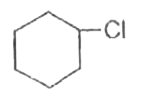Which of the following will be readily soluble I water ?




The correct Answer is:B
To determine which of the given compounds will be readily soluble in water, we can follow these steps:
Step 1: Identify the Compounds
First, we need to identify the compounds that are being compared for their solubility in water. Common examples of haloalkanes and haloarenes include chloroethane, bromoethane, iodoethane, and chlorobenzene.
Step 2: Understand Water Solubility
Water solubility is influenced by the polarity of the compounds. Polar compounds tend to dissolve well in water due to the ability to form hydrogen bonds with water molecules. Non-polar compounds, on the other hand, do not interact favorably with water and are less soluble.
Step 3: Analyze the Functional Groups
Haloalkanes and haloarenes contain halogen atoms (F, Cl, Br, I) attached to carbon. The presence of electronegative halogens increases the polarity of the molecule, but the overall structure also matters:
- Haloalkanes: Generally, smaller haloalkanes (like chloroethane) are more soluble due to their lower molecular weight and ability to interact with water.
- Haloarenes: Compounds like chlorobenzene are less soluble because the aromatic ring is non-polar, which reduces overall polarity.
Step 4: Compare Solubility
Based on the analysis:
- Chloroethane is more likely to be soluble in water compared to chlorobenzene because it is a smaller molecule and can engage in hydrogen bonding with water.
- Larger haloalkanes and haloarenes are generally less soluble due to increased hydrophobic character.
Step 5: Conclusion
From the comparison, we can conclude that chloroethane (or any small haloalkane) will be readily soluble in water, while chlorobenzene will not be.
Final Answer
Chloroethane is readily soluble in water.
---
First, we need to identify the compounds that are being compared for their solubility in water. Common examples of haloalkanes and haloarenes include chloroethane, bromoethane, iodoethane, and chlorobenzene.
Water solubility is influenced by the polarity of the compounds. Polar compounds tend to dissolve well in water due to the ability to form hydrogen bonds with water molecules. Non-polar compounds, on the other hand, do not interact favorably with water and are less soluble.
Haloalkanes and haloarenes contain halogen atoms (F, Cl, Br, I) attached to carbon. The presence of electronegative halogens increases the polarity of the molecule, but the overall structure also matters:
- Haloalkanes: Generally, smaller haloalkanes (like chloroethane) are more soluble due to their lower molecular weight and ability to interact with water.
- Haloarenes: Compounds like chlorobenzene are less soluble because the aromatic ring is non-polar, which reduces overall polarity.
Based on the analysis:
- Chloroethane is more likely to be soluble in water compared to chlorobenzene because it is a smaller molecule and can engage in hydrogen bonding with water.
- Larger haloalkanes and haloarenes are generally less soluble due to increased hydrophobic character.
From the comparison, we can conclude that chloroethane (or any small haloalkane) will be readily soluble in water, while chlorobenzene will not be.
Chloroethane is readily soluble in water.
Topper's Solved these Questions
- BOOK - AAKASH INSTITUTECHAPTER - HALOALKANES AND HALOARENES EXERCISE - ASSIGNMENT SECTION - C38videos
HALOALKANES AND HALOARENES
- BOOK - AAKASH INSTITUTECHAPTER - HALOALKANES AND HALOARENES EXERCISE - ASSIGNMENT SECTION -D15videos
HALOALKANES AND HALOARENES
- BOOK - AAKASH INSTITUTECHAPTER - HALOALKANES AND HALOARENES EXERCISE - ASSIGNMENT SECTON - A45videos
HALOALKANES AND HALOARENES
- BOOK - AAKASH INSTITUTECHAPTER - GENERAL PRINCIPLES AND PROCESSES OF ISOLATION OF ELEMENTSEXERCISE - Try Yourself33videos
GENERAL PRINCIPLES AND PROCESSES OF ISOLATION OF ELEMENTS
- BOOK - AAKASH INSTITUTECHAPTER - HYDROCARBONSEXERCISE - Assignment(Section - D) (Assertion -Reason Type Question)24videos
HYDROCARBONS
Similar Questions
Knowledge Check
- Question 1 - Select One
Which one is appreciably soluble in water
ACS2BC2H5OHCCCl4DCHCl3 - Question 2 - Select One
Which of the following is sparingly soluble in water ?
AEthanoic acidBo-nitrophenol shows intramolecular H-bondingCp-NitrophenolD2,6-Dihydroxy benzoic acid - Question 3 - Select One
Which of the following is sparingly soluble in water?
ABeSO4BMgSO4CCaSO4DBaSO4
Which of the following sulphates are soluble in water?
View SolutionWhich of the following is slightly soluble in water?
View SolutionWhich of the following balides are not soluble in water ?
View SolutionWhich of the following alcohol is least soluble in water ?
View SolutionWhich of the following vitamins are soluble in water ?
View Solution

